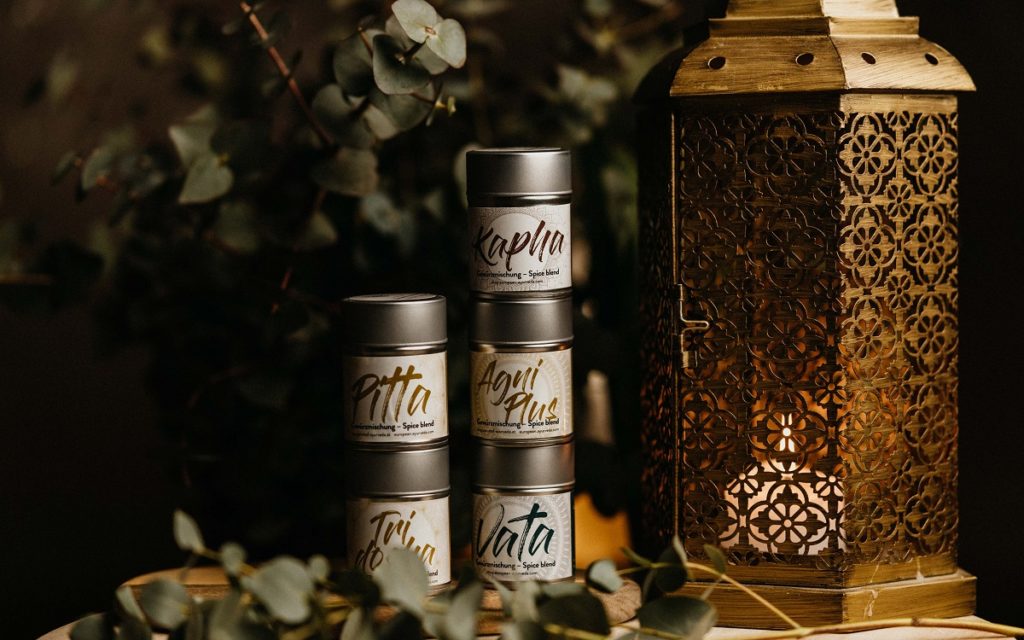Water has always been the most important element and the basis of life. It is not for nothing that numerous Ayurvedic texts contain the element in its various forms. The positive effects of water on a person's physical well-being speak for themselves. You can find out why you should drink warm water according to Ayurveda here.
The benefits & properties of hot water
We have been told since childhood that water is important for health and performance. In Ayurveda , the quantity and temperature play a decisive role.
The following properties are attributed to hot water in Ayurveda:
- more energy
- Support for strong, radiant skin
- Prevention of digestive problems
- Calming the mind
- Refreshment for the whole body
- Life-giving effect
- Cleansing properties
For a successful cleansing of your body with water, Ayurvedic teachings recommend boiling the water before drinking. Spices and herbs can also be added for a better effect and to strengthen your body.


Discover delicious Ayurvedic teas now
Ayurvedic tea is an integral part of Indian medicine. You can use it to cleanse, heal and stimulate your body - or simply relax with a warm cup. Here you will find selected Ayurvedic teas of different varieties in the best quality.
Improved vitality through warm water
In Ayurveda, hot water is drunk in the morning to start the day with more energy. Your tiredness is dispelled and your spirits awakened, making you feel fitter straight away. It is best to incorporate a glass of warm water into your Ayurvedic morning routine to start the day full of energy.


For more flavor, you can add spices to the water to prepare an Ayurvedic drink for the morning. Turmeric, for example, is ideal for this or you can make yourself an unsweetened tea.
The warmth not only creates a pleasant feeling inside you, but also compensates for the loss of fluids overnight. This improves your overall vitality and you will quickly notice that your skin becomes more radiant.
Hot water to promote healthy digestion
Water plays a fundamental role in healthy and strong digestion. Too little or cold liquid damages the digestive fire Agni and can extinguish it. Your body also needs six hours to digest cold water, whereas it only needs one and a half hours for warm water.


Hot water therefore particularly stimulates Agni and promotes digestion. This makes it easier for deposited waste products and toxins to be transported out of your body . This in turn has a positive effect on your recovery and supports the cleansing of your body.
Easier weight loss with hot water
Hot water can also help you lose weight. If you feel hungry between meals, you are often just thirsty. A glass of hot water can calm the feeling of hunger - which is not hunger at all. The hot water also supports detoxification and fat burning, which brings pleasing results in the Ayurveda diet.
Drinking warm water in Ayurveda
Boiling water in Ayurveda releases energies that are stored in the water molecules. As a result, they are transferred directly to your body when you drink the water. This practice has been used in Ayurvedic medicine for centuries.


In addition, the water becomes thinner from a chemical point of view due to the long boiling process. This now thinner and short-chain Ayurvedic water is better able to transport water-soluble waste products and metabolic residues out of your body.
All components of food that cannot be converted into energy remain in your body as metabolic residues. In Ayurveda, this is referred to as ama, which from an Ayurvedic point of view is the beginning of every illness. Ayurvedic, warm water can better remove these from your body.
Boiling also purifies the water and changes its structure. Lime, for example, is crystallized and evaporated. The heat also helps to remove metabolic residues in the digestive tract more effectively. The digestive fire Agni is also supported in its work by the warm Ayurvedic water. Afterwards, you will feel better and have more energy!
Balance the doshas with hot water
Your constitutional type also plays an important role in the correct intake of water. Depending on the three doshas, you should boil your water for different lengths of time and enrich it with different spices. You can find out which Dosha dominates in your case in the Dosha test.
In Ayurveda, water is always boiled for at least 10 minutes, whereby a distinction is also made here between the individual doshas.
- Vata types should let the water boil for 10 minutes until it has reduced by a quarter in the pot.
- Pitta people about 15 minutes until one third has evaporated.
- Kapha people should let the water boil for about 20 minutes until only half of it is left.
Although in Ayurveda warm water should be drunk pure in the morning, you can add the following herbs and spices depending on your constitution. This adds flavor to the warm water and provides your body with additional healthy nutrients. The following times refer to water that has already been boiled:
- The Vata type should boil one and a half liters of water for five minutes. Then add three leaves of mint, ⅕ teaspoon of fennel seeds and ¼ teaspoon of marshmallow root. The water should now be drunk lukewarm throughout the day.
- To calm pitta, two liters of water are boiled for two minutes. Then add ¼ teaspoon of fennel seeds, two rosebuds and a clove to the water. In summer, the water can be drunk at room temperature, in winter a little warmer.
- To balance Kapha, boil one liter of water for five minutes. Then add three basil leaves, two thin pieces of fresh ginger, ¼ teaspoon of cumin and ½ teaspoon of fennel to the water. It works best when drunk hot to lukewarm throughout the day.


Discover Ayurvedic spices for your dosha now
Spices and herbs are as much a part of Ayurvedic nutrition as a sense of balance is to yoga! And here too, it is important to use the right ingredients in order to ideally regulate the balance of the doshas.
Drinking the right amount of hot water in Ayurveda
Various factors need to be taken into account when determining the right amount of water per day. In addition to age and weather, diet and workload, average stress and your constitutional type also play a role.


Pitta types are generally thirstier than people with Kapha characteristics. However, all Ayurveda types should prepare water in the morning and store it in a thermos flask. You should then drink some of it every 30 minutes or so throughout the day.
While a high intake of water during the day is important, Ayurveda recommends a small amount of pure water during meals. Ayurvedic cuisine is already very rich in spices and herbs, which could potentially overwhelm the body if the intake is increased.
Depending on the meal, about one cup of water per meal is recommended. For liquid dishes such as soup or dhal, a lower fluid intake is sufficient. For dry dishes, however, you should compensate with more water. It is best to pay attention to the recommended temperature of the water depending on your constitution. However, you should avoid drinking (ice) cold water so as not to quench your digestive fire.
Read more


Ayurveda colon cleansing and intestinal detoxification
A healthy intestinal flora is therefore essential for your entire organism. You can find out how Ayurvedic colon cleansing works and how you can do it at home here.




